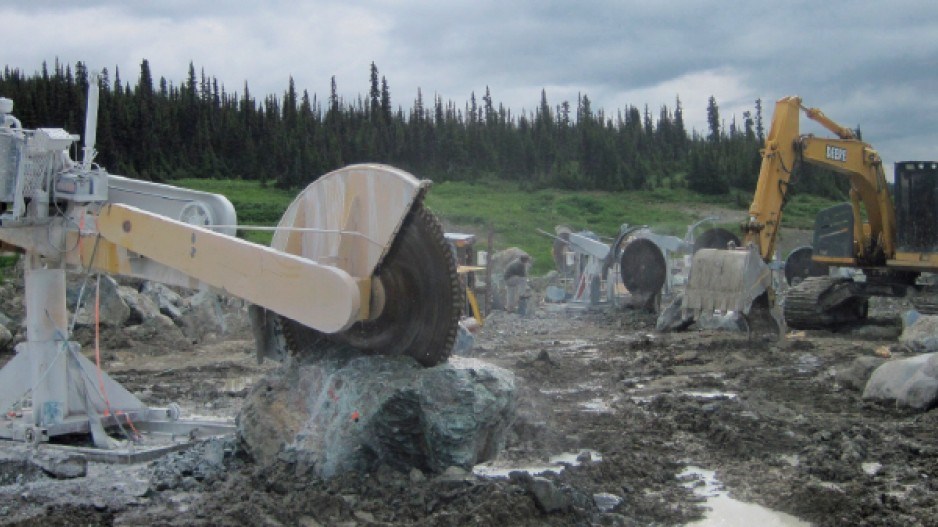A spike in Chinese demand for B.C. jade is driving a jade rush in northwest B.C., according to B.C. jade producers.
“Demand for jade in China is certainly at an all-time high,” said Kirk Makepeace, president of Jade West Group, one of B.C.’s two largest jade companies. “It’s unprecedented what’s happening [in B.C.].”
Jade West mines jade in Dease Lake and north of Fort St. John. It sells the rough stone for export and retails finished products through a website and B.C. retail locations.
Makepeace said a decade ago China had little interest in B.C. jade – nephrite. It favoured a different jade, Burmese jadeite.
“We used to go over to China and try to offer our British Columbia jade to the Chinese, and they basically had their noses up in the air and said, ‘That’s not real jade.’”
But Makepeace said China had forgotten its history: nephrite was the traditional jade found in China; jadeite had been introduced into the country 200 years ago.
He said the 2008 Beijing Olympics reignited China’s interest in nephrite because China used the stone in Olympic medals and ran a campaign to remind its residents that nephrite is the country’s traditional jade.
Makepeace said the subsequent surge in demand has resulted in skyrocketing jade prices. For example, an export-oriented, jewelry-grade jade currently sells for $200 a kilogram – a 10-fold increase from a decade ago.
He said renewed interest in B.C. jade has driven Jade West’s sales up by 300% over the past three years.
Tony Ritteris an owner of Cassiar Jade Contracting Inc., which operates in B.C. and the Yukon. He also reported a jump in China’s appetite for jade.
“It’s crazy, to be honest with you,” said White Rock-based Ritter, who added that his company now produces about 400 tonnes of jade annually. “We’ve probably almost doubled [our staff] in the last three years.”
Makepeace said that while B.C. jade producers have quadrupled pre-Olympics production levels to approximately 800 tonnes annually, they’re still meeting only about half of Chinese demand.
He said Jade West will reopen an idled mine this year at Dease Lake to join the company’s other two operating mines. He added that he plans to double the number of mine employees to 20 by 2015.
“We certainly don’t want to flood the market, but the mines will be increasing [production].”
Makepeace added that, besides driving business growth for B.C. jade producers, the increased demand and high jade prices are attracting jade prospectors to the Cassiar and Dease Lake areas.
“There’s a jade rush going on, and people clamouring to get jade from British Columbia, which has also resulted in an awful lot of people staking jade claims where there’s either no commercial jade or nothing, just trying to get on the bandwagon,” Makepeace said. “Unfortunately I think there’s an awful lot of Chinese who are being sold moose pasture as potential jade mines.”
Ritter similarly noted an influx of jade hunters in the past year or so staking claims in the Kutchko area near Dease Lake.
But Makepeace said that while more jade discoveries are possible, much of B.C.’s jade isn’t commercial quality in the current market, which is looking for jewelry-grade jade. For example, he said that some of B.C.’s early jade mines in the mountains in Lillooet have been idled since the discovery of higher-quality mines in northern B.C.
But Makepeace said Chinese museums are full of lower-grade jade that, while not sharing the esthetics of jewelry-grade jade, can still be intricately carved. He added that if interest in that type of jade is rekindled in China, B.C.’s jade market will expand further. “If China starts to fall in love with more of our jade, then the other mines will open up, because there’s lots of jade in the province, but right now the focus has been the jewelry end of it.”
Neither senior tier of government tracks B.C.’s jade production; producers’ estimates are the best data available.
A high Chinese import duty on B.C. jade is causing headaches for B.C. exporters, according to Tony Ritter, an owner of Cassiar Jade Contracting Inc.




